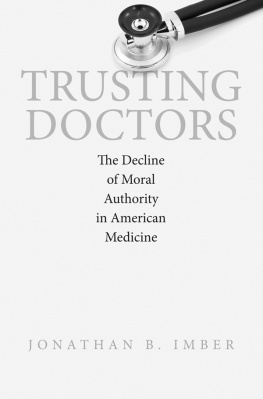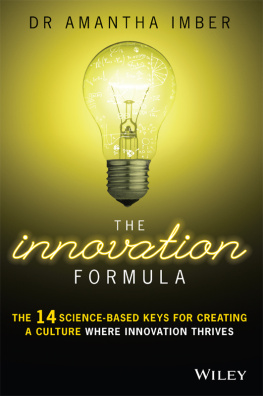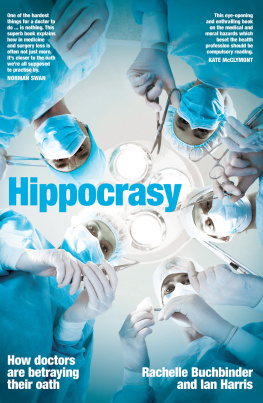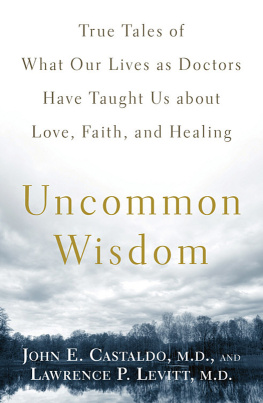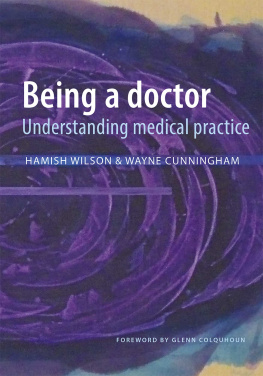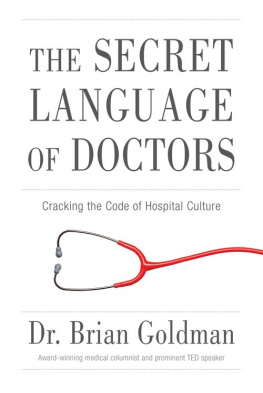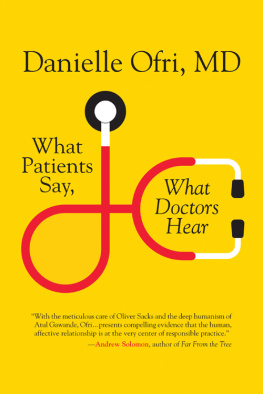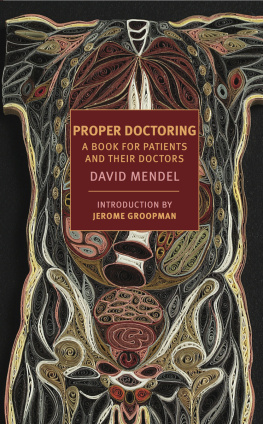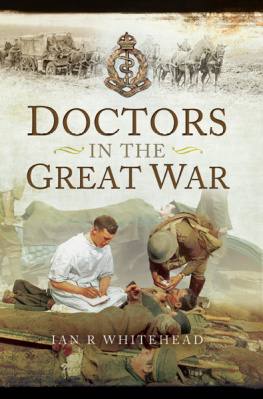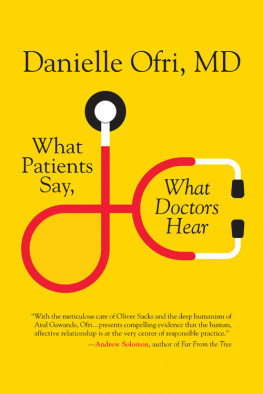
TRUSTING DOCTORS
TRUSTING DOCTORS
The Decline of Moral Authority in American Medicine
JONATHAN B. IMBER
PRINCETON UNIVERSITY PRESS Princeton and Oxford
Copyright 2008 by Princeton University Press
Published by Princeton University Press, 41 William Street, Princeton, New Jersey 08540
In the United Kingdom: Princeton University Press, 6 Oxford Street, Woodstock, Oxfordshire OX20 1TW
All Rights Reserved
Library of Congress Cataloging-in-Publication Data
Imber, Jonathan B., 1952
Trusting doctors : the decline of moral authority in American medicine / Jonathan B. Imber.
p. cm.
Includes bibliographical references and index.
ISBN 978-0-691-13574-8 (hardcover : alk. paper) 1. Medical ethics. 2. Medical policyMoral and ethical aspects. I. Title.
R724.I5446 2008
174.2dc22 2008005153
British Library Cataloging-in-Publication Data is available
This book has been composed in Minion
Printed on acid-free paper.
press.princeton.edu
Printed in the United States of America
10 9 8 7 6 5 4 3 2 1
To Amy, Elizabeth, and David
And to the blessings of family

All in all there are two things, two remediesboth for internal usewhich, regrettably enough, physicians nowadays forget or neglect to prescribe. Alas, it is all the more regrettable that neither one nor the other is particularly easy to manage, even though the physician did remember to prescribe it. One of these, used when everything is safely overa small dose, a drop is sufficient; too much is detrimental and may even elicit the opposite effectis jesting, a timely jest, a felicitous fancy, a priceless, surprising something, a droll, jesting incident, a turn of phrase that all of a sudden turns everything upside down. In other words, jesting is one; the other, which physicians nowadays do not prescribe either, is the pastor.
Sren Kierkegaard to Julie Thomsen, January 1849
Hence too probably the fact that transactions of healing are so closely connected, the world over, with sentiments of religion. Perhaps the fact is due, in part, to some latent association that connects diseases with sin and, to much the same extent, connects the hope of healing with some possibility of a divine medication. However this may be, the mystery of healing, as we are constituted, stands in close affinity with God and the faith of his supernatural operation.
Horace Bushnell, Nature and the Supernatural, 1858
CONTENTS
PREFACE
A Sociological Perspective
I began research on this book with the assumption that not only is trusting doctors one of lifes necessities, but that doing so is connected to the essential meaning of professional character. A profession that is not a conspiracy against the laity must demonstrate through each one of its practitioners a consistency in character that is not exclusively based on intelligence and technical skills. The capacity to deal adequately with other human beings, which is certainly one element of competence, also reflects the cultural expectations that link together professionalism, character, and trust.
The very notion of character, and a focus on the individual practitioner, may at first appear to challenge the standard sociological perspective on medicine. That perspective, both in terms of personal accountability and social epidemiology, has established beyond question the importance of structural considerations with regard to the organization and delivery of medical services. But the bases for trusting a doctor within these dimensions have always required more than professional competence and more than institutional efficiency. Over the decades at the end of the twentieth century, doctors in America were compelled to adapt to the demands of the financial and corporate architects of managed care, just as at the beginning of that century they needed to adapt to the clinical expectations of scientific medicine. Something of lasting consequence must be at stake in the fact that physicians today think about issues in new ways and that their practices are organized very differently from those of their predecessors, yet we continue to call them doctors even as we reconsider what our trust in them entails.
After World War II, social science (with the exception of economics) and medicine worked largely in collaboration. Throughout most of the 1950s, the sociological study of medicine was conducted within the systems of medical education and allied medical services in an effort to inform and transform them. The emergence of an adversarial social science critique within medicine never amounted to much during this period, largely because of a rapid transformation in who was seen to be working within rather than outside the system. Within this context, the chief success of the new field of medical ethics during the past three decades or so has been institutionalthat is,
Despite the existence of overdetermined conceptualizations of professional dominance and deviant practitioners, overintellectualized celebrations of physician virtues, and overgeneralized despair about a starved medical system, the practicing physician is still expected to clarify and help resolve the many difficulties of those who seek medical attention. I, too, seek to clarify difficulties. For the sociologist, there are principally two approaches, which are not mutually exclusive: (1) to conduct empirical research in whatever present one finds oneself, in order to report as honestly and as clearly as possible what is currently the case, and (2) to search the historical record for material that enhances our understanding present circumstances. In my book Abortion and the Private Practice of Medicine, I combined these two approaches to examine the historical and social sources of the medical professions intellectual and moral ambivalence about abortion. Despite the fact that courts and social movements have entirely usurped public discourse on this issue, physicians have their own stories to tell about the meanings of their work, whether or not the courts or partisans in the abortion wars want to hear them.
At certain points in this new book, by using both historical and more contemporary examples of the evolving nature of medical morality, I will consider the topic of abortion again, here to illustrate what I consider a central aspect of the challenge of medical vocation and public trust in the profession, that is, how the culture of medical practice intersects with the demands of historical change, in particular around that cluster of issues now called bioethical. My argument is intended to be straightforward: the stances taken about medical morality by Catholic writers, which included centrally the matter of abortion and which were largely marginal to public interest and attention during the nineteenth century, have reappeared with remarkable public salience over the last few decades. Today questions about abortion, end-of-life care, and new medical technologies have so profoundly affected public consciousness that it is impossible to write a history of American judicial and legislative developments without understanding how the politics of these issues arose out of specific cultural changes in both medicine and the larger society.
One of these changes pertains to the ways in which public trust in the character and person of the physician has been diminished in the face of For more than thirty years, successive presidential commissions and advisory groups have offered counsel about politically charged and ethically complex matters, with the matter of abortion in one respect or another always claiming a place for attention as emblematic of questions about the value of human life.
Next page
